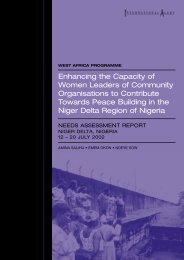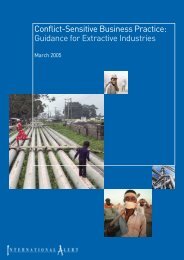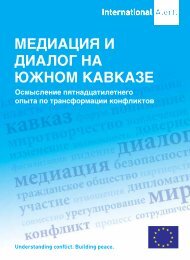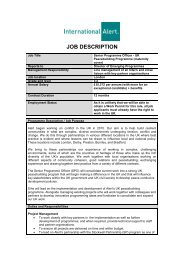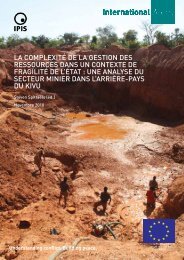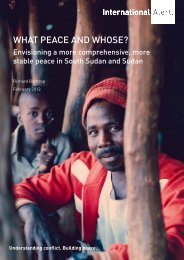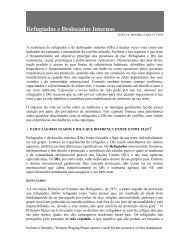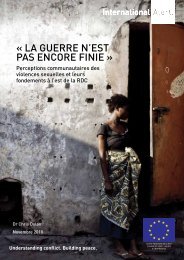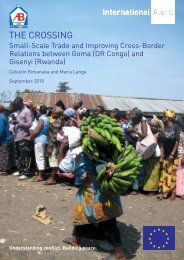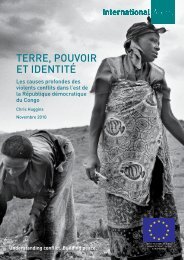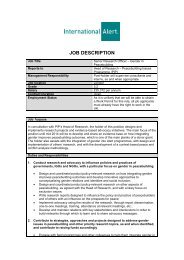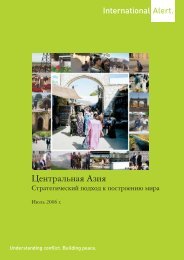44 • Women’s Bodies as a Battleground: Sexual Violence Against Women and Girls During the War in the Democratic Republic of Congobeen left deeply traumatised by these experiences. It has been noted that many of them display an alteredattitude towards family authority, ranging from lack of respect and intolerance to contempt and evenblame for their parents for not having managed to prevent what happened.6.1.3 Socio-economic consequences of the rapesAs mentioned above, the war and the sexual violence perpetrated against women has contributed in largemeasure to the erosion of the economic and social fabric of communities in South Kivu, because thevictims are the active members of the female population and thus the main driving force behind the ruralsubsistence economy.Eighty per cent of the population of the Kivus are engaged in agriculture and 70% of that group is women.They are essential workers, responsible for the upkeep and preservation of their communities, whosesurvival depends largely on their productive and reproductive capacities. As farmers, rural women providefor their families’ everyday needs, and they sell their surplus produce to meet the families’ other vital needssuch as education, clothing, medical expenses and, when they are able, the purchase of tools for cultivatingtheir fields. The tasks of drawing water and gathering firewood in the forest also fall to them. In addition,the women are active in the informal economy, through selling goods locally for everyday consumption,including basic essentials such as cassava, fish, vegetables, palm oil, salt, soap and charcoal.Sexual violence has led to a lowering of women’s productivity and therefore the impoverishment ofcommunities. Physically and morally weakened, some victims can no longer work in the fields, or carryon their trading activities. In addition, rape is always accompanied by pillage, leaving the womencompletely stripped of the fruits of their labour and of their means of production – such as they were.Rapes that are committed against women farmers working in their fields are systematically followed bythe pillaging of their crops and their farming implements. When the attacks take place in the victims’homes, their small livestock, poultry, kitchen utensils, money, clothing and provisions are all stolen. InFizi, Shabunda and Walungu the family home is often burned down. When attacks occur on the roads,the perpetrators strip their victims of their money and sometimes their clothes. Given this situation,women traders are increasingly wary of venturing onto the roads or taking their produce to local marketsfor fear of being raped, robbed or killed. Many rural communities have therefore lost their main sourcesof supply and cases of severe malnutrition are increasing at a dangerous rate. In some communities, thewomen farmers have tried to get round the problem of insecurity by cultivating small plots around theirhomes, which enables them to continue growing vegetables and other basic items necessary for theirfamilies’ survival.Given this situation and the resulting precariousness of their lives, the fear of being stigmatised and thelack of any prospects for lasting peace in the short or medium term, many women who have enduredsexual violence have opted to leave their communities, which are thus deprived of their essential socialand economic driving force. The abduction of girls and young women and their confinement in the armedgroups’ camps also represents a loss of active members of society. In addition, many productive youngmen have either been killed in combat or forced to join rebel groups, which does not augur well for thesocio-economic future of South Kivu.
45 • Women’s Bodies as a Battleground: Sexual Violence Against Women and Girls During the War in the Democratic Republic of Congo7The Motives of the Soldiers and Militiamen Involved inRape and Sexual ViolenceThis chapter attempts to decode and gain an understanding of the reasons behind the sexualviolence committed by members of the various armed forces involved in the war in the DRC.What drives them to indulge in these particularly barbaric acts of sexual violence and abuseagainst Congolese women and girls?It is clear that these acts of violence are linked to the persistence of unequal gender relationsand particularly to the way women’s bodies are regarded. War exacerbates this inequality ofpower relations because the general security crisis places women in an even weaker and morevulnerable position. However, there are also other reasons, no less important, of a political,socio-economic and psychological nature. This chapter endeavours to identify and analysethese reasons, mainly on the basis of the data gathered from the 492 women and 50 RCDsoldiers and Maï Maï militiamen who took part in the survey.Given the small number of combatants interviewed, the authors took the decision to basetheir analysis on the perceptions, interpretation and understanding of the womeninterviewed regarding the sexual violence and torture they had experienced. The reasons forthe violence are thus presented in this chapter from the viewpoint of the victims.The few RCD soldiers and Maï Maï militiamen interviewed did provide some explanationsregarding the motives of their respective armed forces. However, these piecemeal testimoniesdo not make the issue any more understandable in all its aspects and complexity. To havegained a real understanding it would have been necessary to interview members of all theprincipal armed groups active on Congolese soil – that is, as well as the Maï Maï and theRCD troops, the Interahamwe, FDD, FNL, Banyamulenge, the national armies of Rwandaand Burundi – and above all, representatives of the high command of these forces.Unfortunately, the research team’s repeated attempts to contact all the parties involved wereunsuccessful. This aspect of the research would be worth investigating further.7.1 The viewpoint and perceptions of the victims and of thosemembers of armed groups who were interviewedThe women’s own interpretations, confirmed by the comments of the soldiers and Maï Maïfighters who were interviewed, demonstrate the multiplicity and diversity of the motives ofthose responsible for the rapes and sexual violence. It seems clear that a broad range offactors – political, ideological, psychological and socio-cultural – is at the root of these actsof extreme violence.7.1.1 The lack of organisational structure, training and discipline among thefighting forcesEighty-three per cent of the women interviewed gave structural reasons as one of the mainfactors behind the perpetration of sexual violence. In their opinion, these acts are a result ofthe disorganisation and predatory nature of most of the armies and militias active in SouthKivu, as well as the lack of discipline among the combatants.



